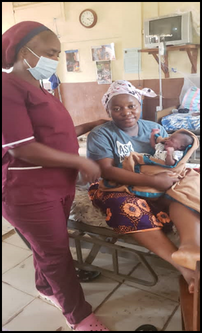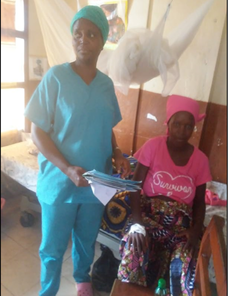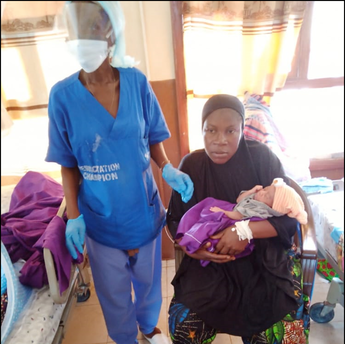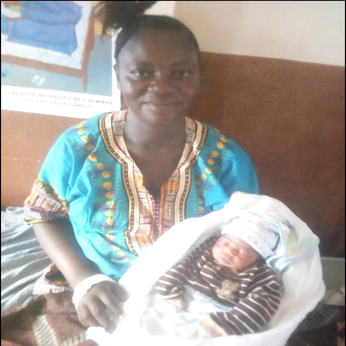 Musu was at term and in beginning labor when she came to Mercy Hospital, but due to her tiny stature, her pelvic structure was too narrow for her healthy baby girl to be delivered. An emergency caesarean section was ordered, and the baby safely made her entrance into the world. Mother and baby received post-operative care and were discharged in good health. "Thank you for being there when I needed help!" she told the surgical team. "Prolonged labor can occur when there is disparity between the fetal head and the pelvis," Dr. Aruna Stevens, who performed the surgery, explained. "The passage might be inadequate, or the passenger's head might be too big." We're glad Musu's baby had a safe journey into life!
0 Comments
 A transverse fetal position is rare, occurring in approximately one out of 300 deliveries. For women without access to a hospital delivery, a baby in the transverse position (lying sideways, instead of head down) is likely to be stillborn. 26-year-old Kadiatu presented at the hospital in advanced labor, and an ultrasound revealed the baby was lying transverse, making a normal vaginal delivery impossible. The Mercy surgical staff performed an emergency caesarean section, delivering a baby girl, who was healthy but required resuscitation. "The condition is most common with multiparous patients (multiple births) because of the lax uterus," Dr. Aruna Stevens explained. "The fetus lies in any position that she feels is comfortable because of the large space available, which sometimes causes malpresentation." Kadiatu and her grateful husband credit Dr. Stevens and his team for saving their baby's life.  Kadiatu's pregnancy was near term when she came to the hospital with severe complications, including appendicitis, umbilical hernia, and ovarian cyst, endangering both her life and that of her baby. The Mercy surgical team quickly delivered the baby, a healthy baby girl, and subsequently performed an appendectomy, cystectomy, and hernia repair on the mother. Mom Kadiatu received a transfusion from Mercy's blood bank and after a brief hospital stay, was released in good condition. The emergency surgery almost certainly saved the life of both Kadiatu and her precious baby girl.  Josephine came to the hospital in non-productive labor, and an examination revealed that the baby was in distress. An emergency c-section was performed, and the team discovered that the baby's umbilical cord was wrapped around her neck. The baby was quickly freed and began crying without needing resuscitation. Josephine and her beautiful baby girl were discharged in good health. The maternal mortality rate in Sierra Leone has long been one of the highest in the world, with maternal deaths accounting for more than 30% of all deaths amongst women aged 15-49 years (https://www.unicef.org/sierraleone/maternal-neonatal-and-child-health.) The leading causes of maternal mortality in Sierra Leone are obstetric hemorrhage, hypertension, obstructed labor and sepsis. One of Mercy Hospital's primary objectives is to radically improve maternal and infant survival, and the ability to perform emergency surgery is a key provision in achieving the goal.
|
Follow us on social media
Archive
July 2024
Click the button to read heartfelt tributes to a beloved Bishop, co- founder of our mission!
Post
|
Helping Children Worldwide is a 501 (c) 3 nonprofit organization | 703-793-9521 | [email protected]
©2017 - 2021 Helping Children Worldwide
All donations in the United States are tax-deductible in full or part. | Donor and Privacy Policy
©2017 - 2021 Helping Children Worldwide
All donations in the United States are tax-deductible in full or part. | Donor and Privacy Policy






